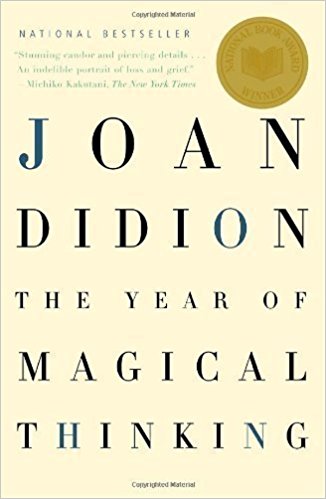Summary | Excerpt | Reading Guide | Reviews | Beyond the book | Read-Alikes | Genres & Themes | Author Bio

From the book jacket: Several days before Christmas 2003, John Gregory
Dunne and Joan Didion saw their only daughter, Quintana, fall ill with what
seemed at first flu, then pneumonia, then complete septic shock. She was put
into an induced coma and placed on life support. Days later – the night before
New Year's Eve – the Dunnes were just sitting down to dinner after visiting the
hospital when John Gregory Dunne suffered a massive and fatal coronary. In a
second, this close, symbiotic partnership of forty years was over. Four weeks
later, their daughter pulled through. Two months after that, arriving at LAX,
she collapsed and underwent six hours of brain surgery at UCLA Medical Center to
relieve a massive hematoma.
This powerful book is Didion's attempt to make sense of the "weeks and then
months that cut loose any fixed idea I ever had about death, about illness . . .
about marriage and children and memory . . . about the shallowness of sanity,
about life itself."
Comment: The Year of Magical Thinking chronicles the 365
days surrounding the death of John Gregory Dunne, Didion's husband of 40 years,
starting a few days before Christmas 2003 when their only daughter, Quintana,
fell seriously ill just five months after getting married. Five days
later, while their daughter lay in an induced coma on life support, Dunne
suffered a massive coronary, leaving Didion battling inconsolable grief.
"Grief comes in waves, paroxysms, sudden apprehensions that weaken the knees and blind the eyes and obliterate the dailiness of life."
On the surface Didion appeared rational and controlled but deep inside she harbored the irrational belief that her husband would somehow come back - she eagerly awaited the autopsy results believing that if she knew what killed him she might be able to fix it, and she can't bring herself to part with his shoes because he would need them if he returned. Her contained reactions caused her to be categorized by the nursing staff as a "cool customer", but despite her internal turmoil she didn't have time to physically wallow in grief, as she was too busy battling her daughter's life-threatening illness. Shortly after Dunne's death Quintana appeared to have recovered, and she flew back to join her husband in California; however she suffered a relapse soon after and went from bad to worse. Sadly, shortly after Didion completed The Year of Magical Thinking, Quintana died at the age of 39. Didion had the opportunity to change the ending of her memoir to reflect her daughter's death but chose not to saying simply, "It's finished".
"This is my attempt to make sense of the period that followed, weeks and then months that cut loose any fixed idea I had ever had about death, about illness, about probability and luck, about good fortune and bad, about marriage and children and memory, about grief, about the ways in which people do and do not deal with the fact that life ends, about the shallowness of sanity, about life itself."
"Didion describes with compelling precision exactly how grief feels, and how it impairs rational thought and triggers "magical thinking." The result is a remarkably lucid and ennobling anatomy of grief, matched by a penetrating tribute to marriage, motherhood, and love." - Booklist.
![]() This review was originally published in The BookBrowse Review in November 2005, and has been updated for the
February 2007 edition.
Click here to go to this issue.
This review was originally published in The BookBrowse Review in November 2005, and has been updated for the
February 2007 edition.
Click here to go to this issue.

If you liked The Year of Magical Thinking, try these:

by Sarah Leavitt
Published 2024
A poignant graphic memoir about the power of art to transform and heal after the death of a loved one.

by Ruby Todd
Published 2024
A young widow grapples with the arrival of a once-in-a-lifetime comet and its tumultuous consequences, in a debut novel that blends mystery, astronomy, and romance, perfect for fans of Emma Cline's The Girls and Ottessa Moshfegh's Death in Her Hands.
Your guide toexceptional books
BookBrowse seeks out and recommends the best in contemporary fiction and nonfiction—books that not only engage and entertain but also deepen our understanding of ourselves and the world around us.